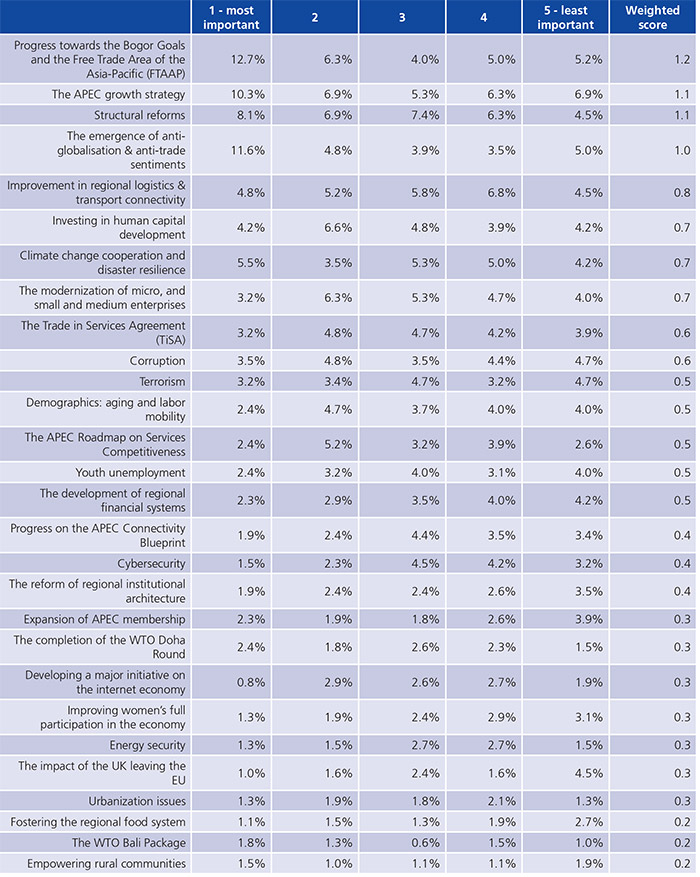ANNEX B - Results of Asia-Pacific policy community survey
This annex presents the findings of a survey of the Asia-Pacific policy community conducted by the Pacific Economic Cooperation Council from 1 August to 9 September 2016. The survey was disseminated through PECC member committees, the APEC Business Advisory Council, the APEC Policy Support Unit and the Asia-Pacific Services Coalition. Panelists were identified on the basis of their knowledge of the Asia- Pacific region.
This is not a survey of public opinion but rather, a survey of those whose views influence policymaking, especially at the regional level. As some of the questions tend to be technical, they require a relatively deep knowledge of developments at regional level. This is by no means a reflection of the general views of a population within any sub-region or even economy. However, we do believe that those surveyed include those who are responsible for influencing and often making decisions on various aspects of their economy’s positions within different regional groups.
The guidance for identifying panelists is as follows:
GOVERNMENT
Panelists should be either decision-makers or senior advisors to decision-makers. As a guide, the government respondents in previous years included a number of former and current Ministers, Deputy and Vice-Ministers, Central Bank Governors and their advisors for Asia- Pacific issues, current APEC Senior Officials, and a number of former APEC Senior Officials.
BUSINESS
Panelists should be from companies who have operations in a number of Asia-Pacific economies or conduct business with a number of partners from the region. This might include each economy’s current ABAC members as well as past ABAC members. In last year’s survey, these included CEOs, vice presidents for Asia- Pacific operations, and directors of chambers of commerce.
NON-GOVERNMENT: RESEARCH COMMUNITY/CIVIL SOCIETY/MEDIA
Panelists should be well-versed in Asia-Pacific affairs, being the type of people governments, businesses, and the media would tap into to provide input on issues related to Asia-Pacific cooperation. These included presidents of institutes concerned with Asia-Pacific issues, heads of departments, senior professors, and correspondents covering international affairs.
In addition to our member committees, we would like to express our appreciation to the National Center for APEC who also circulated the survey to their members, as well as many others who helped in the effort.
RESPONDENT BREAKDOWN
We do not disaggregate results for each economy but rather by sub-regions – Northeast Asia, North America, Oceania, Pacific South America, and Southeast Asia.
- North America: Canada, Mexico, and the United States
- Northeast Asia: China, Hong Kong (China), Japan, Korea, Mongolia, Russia, and Chinese Taipei
- Oceania: Australia, New Zealand, and Papua New Guinea
- Pacific South America: Chile, Colombia, Ecuador, and Peru
- Southeast Asia: Brunei Darussalam, India, Indonesia, Malaysia, Philippines, Singapore, Thailand, and Vietnam
BREAKDOWN OF RESPONDENTS BY SECTOR
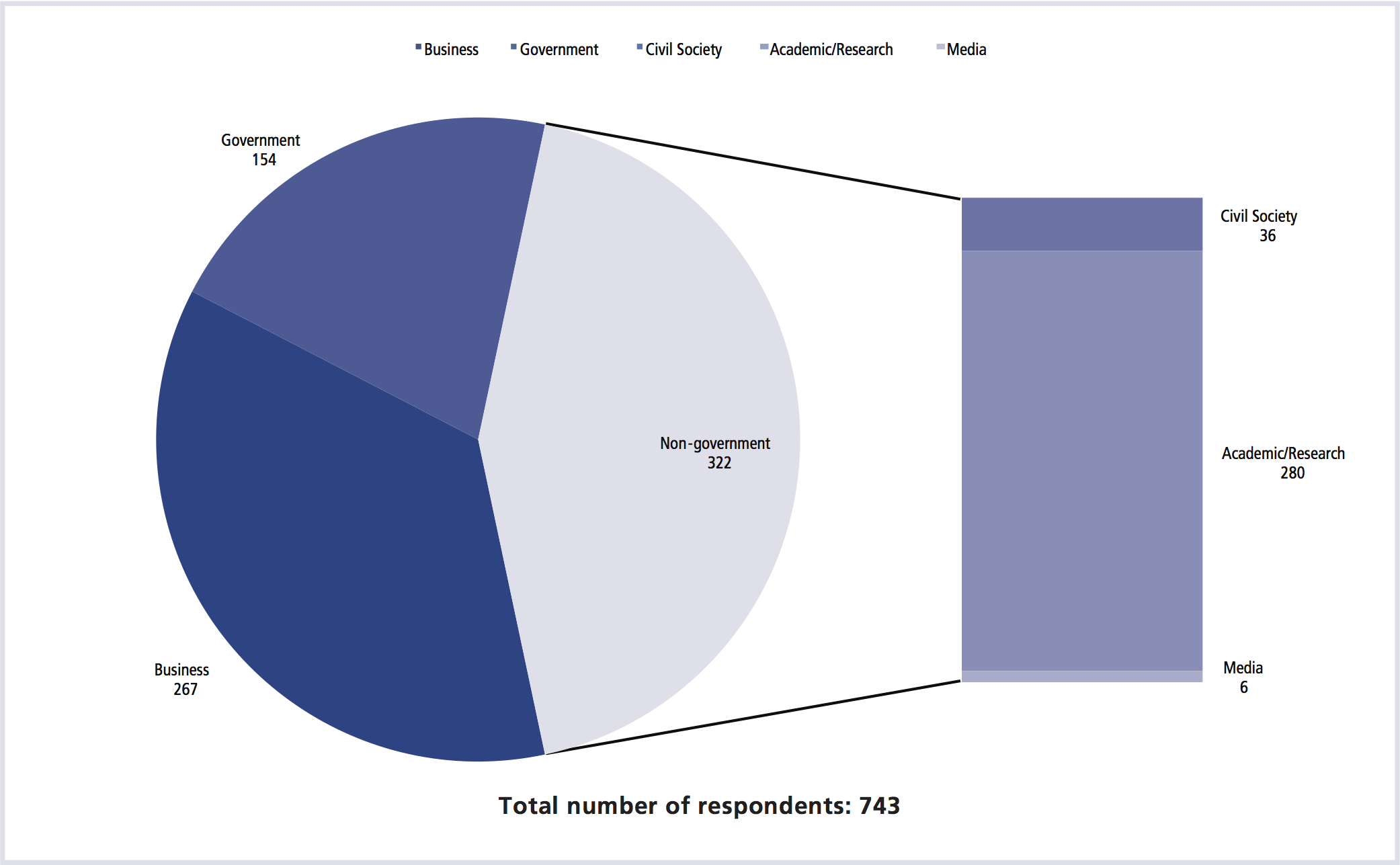
BREAKDOWN OF RESPONDENTS BY SUB-REGION
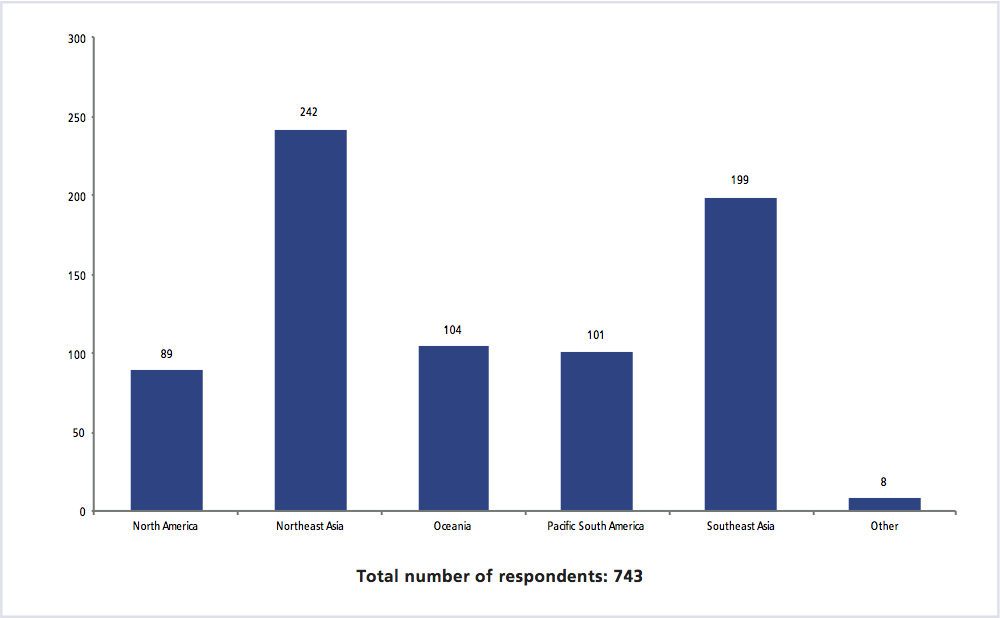
1. What are your expectations for economic growth over the next 12 months compared to the last year for the following economies/regions? Please select/tick the appropriate box.

2. Please select the top five risks to growth for your economy over the next 2-3 years. Select ONLY five (5) risks, using a scale of 1-5, please write 1 for the least serious risk, 2 for the next most serious risk, 3 for the next third highest risk, 4 for the fourth highest risk and 5 for the most serious risk.
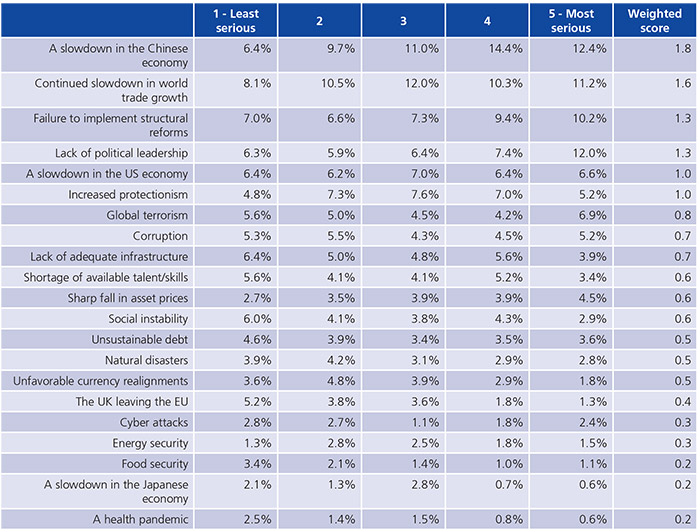
3. How important do you think each of the following will be to driving growth in your economy over the next 5 years?
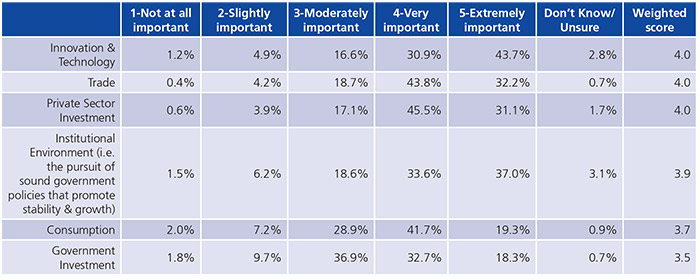
4. Please rate how important each of the following activities by standard industrial classification will be to the growth of your economy over the next 5 years
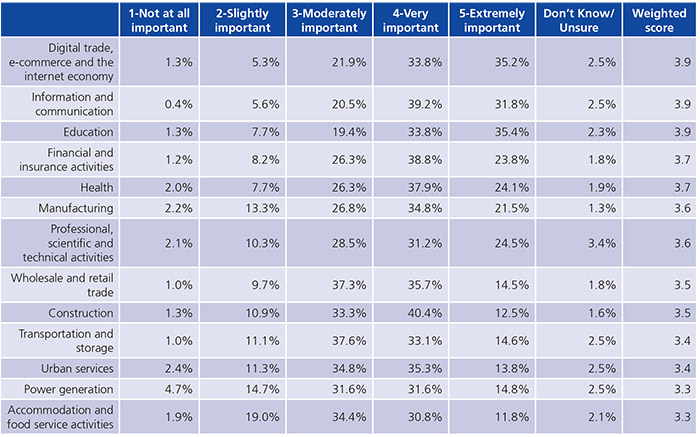

5. On a scale of 1 to 5, how much of an impediment do you think each of the following are to services trade in the region? With 1 being not at all an impediment and 5 a very serious impediment. Please select ‘don’t know/unsure’ if you are not sure of your answer.
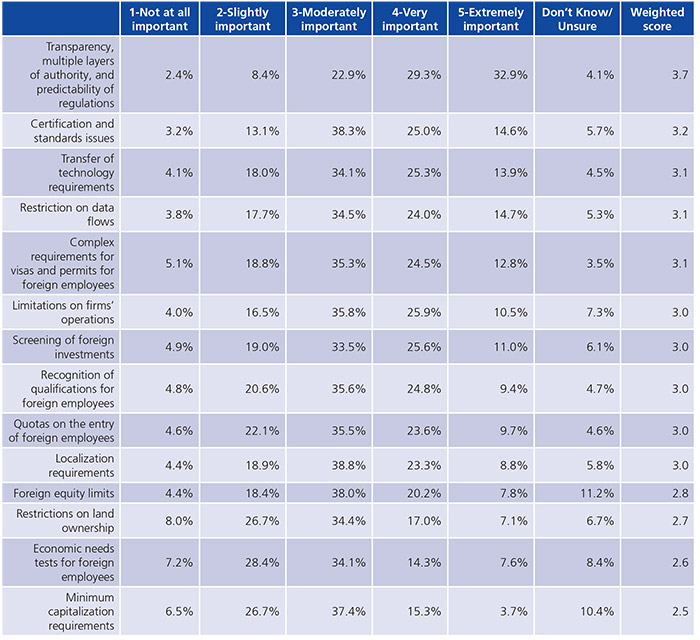
6. For those that you rate 4 and 5 above, what do you think that APEC as a whole should do to address the matter?

7. Please state the level of agreement you have with each of the following statements.
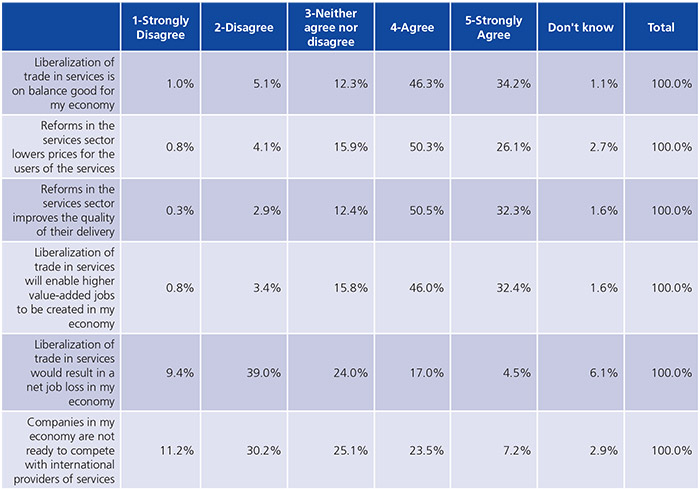
8. How important do you think an efficient services sector is to the following in your economy?

9. How do you think each of the following have impacted growth in your economy since 2000?
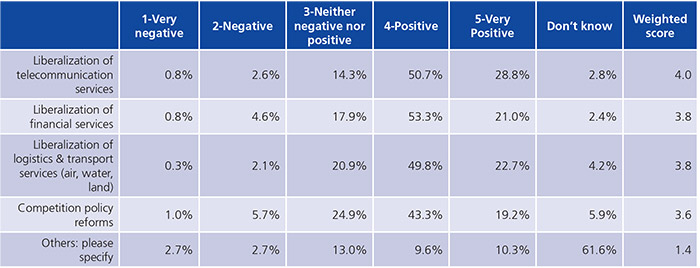
10. How do you think each of the following initiatives, if they are achieved, will impact your economy?
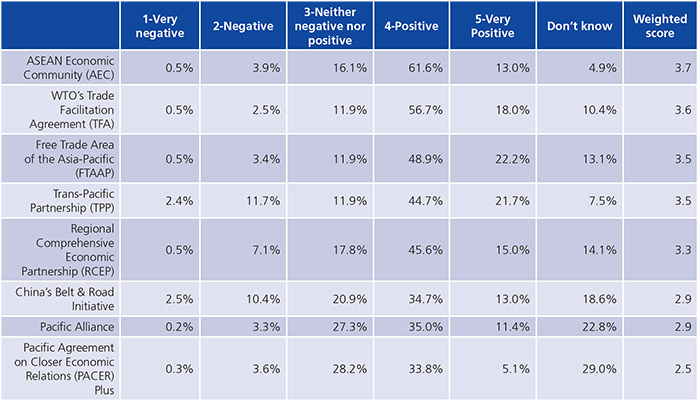
11. Please indicate your agreement or disagreement with the following statements:
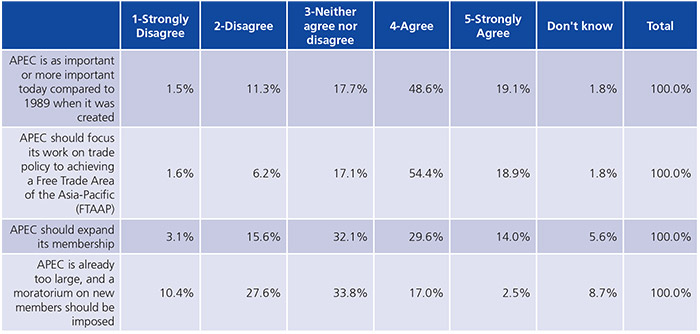
12. How do you assess the political environment for Asia-Pacific freer trade and investment in the coming five years? Please tick the box that best fits your assessment.

13. Please rate each of the following from 1 to 5 on the impact they have on attitudes towards freer trade and investment in your economy with 1 having no impact, 2 a minor impact, 4 a serious impact and 5 a very serious impact. Please select ‘Don’t know’ if you are unaware or not sure of your answer.
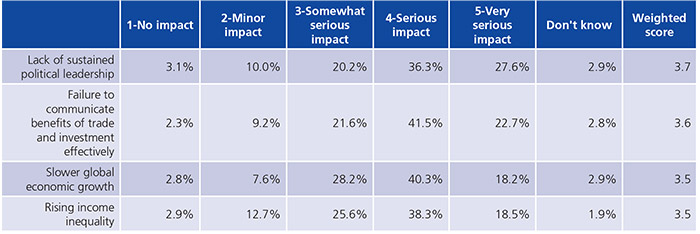
14. What do you think should be the top 5 priorities for APEC Leaders to address at their upcoming meeting in Lima?
